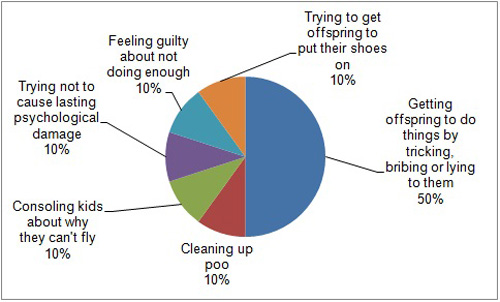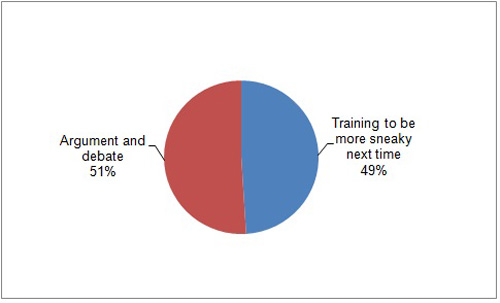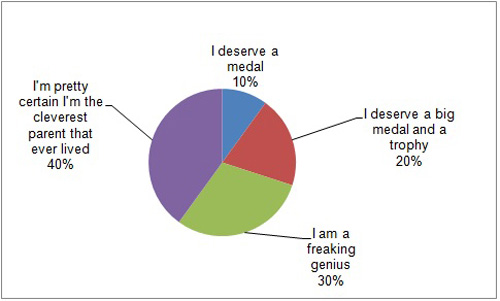- About Us
- Columns
- Letters
- Cartoons
- The Udder Limits
- Archives
- Ezy Reading Archive
- 2024 Cud Archives
- 2023 Cud Archives
- 2022 Cud Archives
- 2021 Cud Archives
- 2020 Cud Archives
- 2015-2019
- 2010-2014
- 2004-2009
 |
Keeping It Together: |
After almost five years on the job, I have discovered that this is what parenting is about:

Aside from the general responsibilities involved in keeping offspring alive, the majority of parenting is basically about lying to your kids. Putting aside the common lies about Santa, the Tooth Fairy and where babies come from, there are also some lies that we tend to tell in order to make things run more smoothly and sometimes, get us out of pickles. Some lies, however, appropriate and necessary as they may seem, can tend to backfire so it is an integral parenting skill to be prepared.
Sometimes, lies seem innocent enough, such as leading offspring to believe we have superhuman qualities. Hubby for example, has the offspring convinced that he is strong enough to wrestle a bear and a lion. Sure, that fits in with the common child's view of their dad as a superhero, but it does backfire when offspring begin to know no fear and are happy to venture in any type of bush land, feeling confident that their dad would be able to help them if they were to be attacked by any type of carnivorous animal.
I, on the other hand, have got super creative with my fantastical attributes. For example, I have discovered that the best answer to questions like "How do you know I was hitting my sister?" or "How do you know I ate all the chocolate?" should simply be responded with "I have special eyes that can always see what you're doing." Uncovering that the source of all your knowledge is basically 50% deductive skills and 50% luck, would reap no benefit. Any explanation as to how you came to a certain conclusion would lead to:

There are, however, times when this technique backfires. For example, when your offspring yells at you from the bathroom:
Offspring: "Mum, is this the hot water, or is this the hot water?"
You: "I don't know, I can't see which tap you're pointing to."
Offspring: "Well use your special eyes!"
After growing tired of the "Who did this?!" "Wasn't me!" routine following broken items or spontaneous messes, as well as the "Go do this!" "I already did!" and absolutely no way to prove otherwise debacle, we began to use the spotty tongue technique. It is as simple as it is genius. Here are the steps:
1. Ask kids a question you want an honest answer to.
2. When they answer, get them to stick out their tongue
3. Tell them that if they are telling a lie, there will be spots on their tongue.
4. Convince them that these are magic spots that only adults can see.
5. Make sure that the first few times you use this method, you ask questions you definitely know the answers to, as naturally sceptical, offspring will have to first be convinced of your ability to deduce the truth. You know you have them fooled when you ask a question and the guilty culprit refuses to stick out their tongue.
However, you must be aware that there is a possibility your offspring will try to use this technique on you. If they tell you that they can see spots on your tongue - be assured that they are lying.
The Special Ear Plugs are a golden ticket that every parent should buy into. I discovered the ear plug technique one day after an extremely loud and disruptive car ride led me to shout, "Right! I am putting in my ear plugs, and then I can't hear any of you!" The mimicking of putting things in my ears led to a few moments of silence to analyse the situation, following a chorus of screaming offspring demanding for me to listen to what they had to say. They continued to shout at each other but when there was no reaction from me whatsoever, there was a return to yelling at me to listen. Finally, one of them clicked.
"Mum! I want to say something about sorry." After a few requests, I casually pulled one of my imaginary ear plugs out and asked if anyone had something to say. They actually apologised and behaved for the rest of the ride home. This is what went on in my head:

However, this method should be used with caution. The next time the above happens and you confidently use the same technique, there is the possibility of a setback. Your offspring are likely to work out that they can take your ear plugs out of your ears in much the same fashion that you put them in. Given their invisible nature, there is no proof that they are not indeed in their clenched hands. If on the off chance you happen to win the battle of the ear plug thievery by ducking out of their reach, you might just overhear the plan of the century where your offspring plan to conspire against you, agreeing that as soon as you get home they should tell you to take a nap and when you fall asleep they will take the ear plugs out and throw them in the bin. You might even hear the conceited sound of little palms colliding into each other in a possible high-five fashion. Once home, you might resist your offspring pulling you onto the couch and getting you to lie down, choosing instead to wash the dishes, at which point you might witness discussion of another sinister plan to trip you over so you can fall down and then they can reach the ear plugs, then contend for the next half hour with offspring trying to bend your knees and tackle you to the ground in very creative ways. Of course, you can never reveal your knowledge of their intentions, as doing so would compromise the credibility of your imaginary sound blocking device. Luckily, this set back can be tweaked, and the ear-plugs can be upgraded to a newer, selective hearing model - which only block out whining voices, and still let in nice ones.
When it comes to discipline, there is one thing for sure - sometimes you just have to scare your kids for them to listen. At first, it might start innocently enough. You have all the best intentions of doing the Time Out method, getting them to sit in a designated area for a predetermined period of time. You put the timer on so that offspring know they have to remain seated in position and wait for you to tend to them after the beep. You commend yourself on ignoring the cries and screams and protests, staying strong, faking the confidence. You tap yourself on the back for not giving them unfulfillable bluff type threats that they do not take seriously, such as "If you don't do this, then I'm not taking you to swimming tomorrow!" (mutually understanding that you definitely will take them to swimming, regardless of what happens in that moment). But then, you make the rookiest of rookie mistakes: you underestimate your offspring's stubbornness and determination. After the good part of an hour and the tenth time of getting down to their level, talking to them calmly, explaining what they did wrong and that they need to say sorry for what they have done, offspring's lips are just as pursed and their arms just as folded as they were in the beginning. Their eyes darting around the room, finding the floating air particles much more interesting than anything you have to say, your blood begins to boil and you know that you will definitely be the first to break. You are exhausted and mentally depleted trying to act calm for so long but really just wanting to curl up in a ball in a slow rocking motion, yet you are simultaneously aware that your other offspring are taking advantage of your distracted nature and have the reign of the house. In a moment of desperation, knowing full well that as soon as the words leave your mouth you have completely compromised the ethics of parenting, you say under your breath, "Fine, don't say sorry. But just be careful of the spider hiding under there." Walking away casually, it only takes seconds for your offspring's shrieks of terror to be followed by a distraught and teary apology, and a plea not to make them sit in the Time Out spot any longer. At this point, this is what you are feeling.

There usually comes a time, however, where your guilt is overridden with relief that the unconventional parenting strategy you seem to have invented is actually a long-standing practice, a generational rite of passage the likes of which are even more deep-seeded and inventive than you ever could have conjured. One day you will realise that your children have been disciplined by a school of thought premised on the idea of "They have to be scared of something, otherwise how will they listen?" You will in fact discover that your offspring are being directed into submission by the use of the fairytale characters of "Gria" and "Liko." These are, a gruesome old lady much like the wicked witch in Hansel and Gretel and of course, The Big Bad Wolf. You might realise that if your offspring are not behaving in a desired manner, the consequence would entail Gria or Liko to appear and discipline them for misbehaving, usually by taking them away. You might only find this out after trying to get your offspring to sleep on a stormy night, when they refuse to believe that the figures on the windows are just shadows of the trees and not in fact the aforementioned mythical creatures. This is especially the case when you try and convince your offspring that they are not real, but they in turn insist that they have to be real because their grandma had specifically pointed out to them the house that Gria lives in and also they have heard Liko knocking on the wall when they muck around at sleep time.
Whenever you leave the kids to be babysat, they should always be told the same thing: "We are going to the doctor." Nothing fun is associated with the doctor. Long waiting periods, possibly an injection... Attempting to tell offspring the truth about where you are going only leads to protests about leaving and world-class debate points about the benefits of taking them along.
It is helpful though, to come up with predetermined answers as to why you are dressed up to go to the doctor and how come the doctor is open so late at night when other things that are open during the day - like the shops - are closed. If going out as a team, it is important to get your story straight. Pick one of you that is ill, decide on the ailment and stick to it. If you have to hop on one foot to make it believable, do it. That helps as one of you is required to take the other to the doctor due to an inability to drive. The only time this will backfire is when one day, you take your offspring with you to a specialist appointment, whereby they discover the brimming cookie jar which they take control of and basically demolish, thus the undesirability of the doctor's office is forever tainted with positive memories.
The last lie is as brilliant as it is magnificent, and credit has to go to Hubby for this one. If your offspring are constantly getting upset about things like wanting to fly, wanting to be a mermaid, wanting snow powers or wanting to be a fairy (as opposed to just fly), the answer is "Well, you have to go to university to learn how to do those things."
Taking your offspring to actually see a university makes the lie that much more believable. The only drawback is when one day you are asked:
Offspring: Mummy, did you go to university?
You: Yes.
Offspring: Why?
You: To learn how to become a teacher.
Offspring: Oh. Why didn't you learn how to become a Queen or a President?
Sometimes we tell lies to protect our children from concepts they do not understand. Sometimes, lies are told to relieve us of having to explain things we cannot explain. Sometimes it is about helping us to manage situations we have no control over. Ultimately, we do the best we can do to deal with little beings who are way more rested, resilient, energetic and intelligent than we are. Time will tell whether children will grow up and chuckle over the lies we have told or end up in arachnophobia therapy.
Born in Skopje, Macedonia, Daniela Ifandoudas is a high school teacher and mother of triplet daughters living in Sydney Australia. When not preoccupied with crowd control, chauffeur duties and keeping up with her offspring’s ridiculously busy social schedule, she makes time to write and spend time with her loving husband Peter... mostly strategising over the best way to tackle crowd control, chauffeur duties and offspring’s social schedule.
